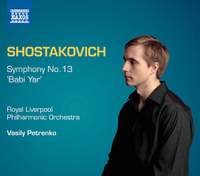Recording of the Week,
Vasily Petrenko completes his cycle of Shostakovich symphonies
Vasily Petrenko's acclaimed Shostakovich cycle with the Royal Liverpool Philharmonic comes to a darkly triumphant conclusion with Symphony No. 13 in B flat minor, 'Babi Yar', released next week on Naxos. Although Nos. 5 and 10 each have their supporters and have been lauded as Shostakovich's finest, in many ways I find No. 13 outstrips both. It sets a series of satirical and dissident poems by Yevgeny Yevtushenko, the first of which meditates on a massacre of Ukrainian Jews by the Nazis - the 'Babi Yar' of the title is the ravine in central Kiev that was the site of the atrocity. In response to such provocative themes, Shostakovich gives full vent to his fury at this and other injustices that he saw around him, and Petrenko's reading of the symphony is an appropriately forceful and lean one.
His initial tempo in the first movement is faster than many, which gives an almost frenetic edge to some of the choral "crowd scenes" that is extremely effective - particularly the first, depicting a pogrom in Białystok, which has a real sense of fear and savagery about it. He keeps the pressure on right through the climax of this section; the moment of the raid on Anne Frank's house is merciless in its intensity, with no hint of melodrama.

Petrenko knows when to allow some wriggle-room, though, and the second movement is exactly the place. It's a characteristically Puckish Shostakovich scherzo that celebrates the role of humour in undermining tyranny throughout history. A cheeky touch of rubato at the beginning sets the tone for a genuinely witty performance - I've sometimes heard this movement played with barely-suppressed rage, but Petrenko's lighter touch keeps things rolling along nicely in keeping with the devil-may-care attitude expressed in the text, and it works excellently. The chorus find their dancing feet in this movement; their tone is pleasantly light rather than hectoring, and their diction is top-notch.
In so far as there is a slow movement, it is V magazinye; a hymn to the endless stoic patience of the Soviet people, here represented by women queuing for provisions at a store. Yevtushenko's quietly noble words draw from Shostakovich a ruminative response, but one which towards the end returns to outrage at the idea that anyone would dare short-change them. Petrenko's handling of the remorseless crescendo underlines just how subdued the preceding piano really was!
Glancing over the text of the fourth movement, it's not hard to see why it went down particularly badly with the authorities. The text is a witheringly sarcastic paean giving ironic thanks for the supposed disappearance of political fears from everyday life. Yevtushenko's words are powerful and resonant, and for Shostakovich this is the cue for the brass to come to the fore with some really biting sforzandi. The horn solo near the beginning, often played a lyrical legato, is here an ironic fanfare for the "court of the lie triumphant". Likewise, as the author recalls the persecutions in ever-growing detail, the trumpets' tone leans towards the bright and sardonic. This seems to be a recurring idea of Petrenko's throughout - and for me, it keeps the music appropriately on edge in a way that a grander sound might not.
The bass soloist, Alexander Vinogradov, is a commanding and powerful anchor throughout; since the words are so important, there's a sense in which the whole symphony revolves around the soloist, and Vinogradov is more than equal to the gargantuan task Shostakovich sets him, conveying a wide variety of moods and emotions with real conviction and sympathy.
The RLPO under Petrenko have shown a new face of this symphony, and I think a truer one than some previous accounts present. It's less majestic, less ponderous, somehow closer to the spirit of both Shostakovich and, particularly, Yevtushenko. It's by no means an easy listen in terms of the subject matter, but this is a convincing and gripping account of a challenging work.
...and to celebrate the culmination of Petrenko's Shostakovich symphony journey, we're offering 20% off the whole series - click here for the special offer!
Alexander Vinogradov (bass), Huddersfield Choral Society & Royal Liverpool Philharmonic Orchestra and Choir, Vasily Petrenko
Available Formats: CD, MP3, FLAC, Hi-Res FLAC



